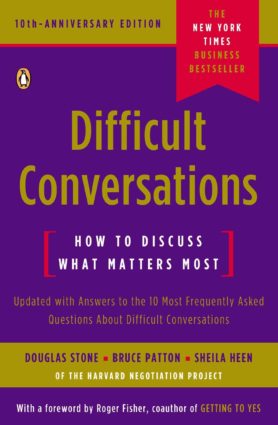Avoid or confront? Some tips about difficult conversations
You, me, and all of us – we are all living in constant interactions with others. After reading a really good book I decided to share some thoughts and tips we all can use in everyday situations to keep away from tension and make our conversations more relaxed and valuable.
Now we are living in a new reality, the pandemic brought us to a different communicating condition often called “New Normal” when we meet others online more often than live. Despite this fact, we are still interacting with others every day: teammates, managers, wives and husbands, kids and neighbors.
Communication is our everyday routine with ups and downs – not all the conversations are happy and relaxed.
Should I tell my teammate that he is late with his task and should spend less time chatting with colleagues?
Should I tell my neighbor that his dog is barking and it drives me crazy?
Should I avoid or confront?
Let’s imagine the situation at work – there is Jonas and his manager Saulius. Saulius asked Jonas to prepare a report for an important meeting at very short notice. Even though Jonas had to cancel his family dinner and stayed at work after his working hours, even though some numbers from the accounting department were missing – he prepared the report on time.

Next morning instead of being praised for doing a great job he got a very angry call from Saulius: “I’ve presented your report to the board and it was full of flaws! How could you do this to me? I said that this is a very important meeting and you couldn’t do it properly? How can I trust you?”
Jonas was shocked. He was checking all the numbers so carefully… He was so outraged and confused that he couldn‘t even say a word… After some time he opened that f… shitty report once again and couldn‘t find any mistake! Now he was angry with Saulius: He is always shouting and can’t even explain what is wrong! Couldn’t he inform me earlier about such an important report? He wants to fire me or what?
Have you ever been in similar situations?
Have you ever been in similar situations? Hope not 🙂 However, this can be a reflection of some situations from real life. There are some tips to handle conversations better:
1. Stay in a mode of “I am not right” and explore each other’s story.
You will ask – how can it be? Of course, I‘m right.
Saulius also felt that he was right. The point is: difficult conversations are almost never about getting facts right. They are about conflicting perceptions, interpretations, and values. An exemplary situation would be more promising if Saulius could stop for a moment and think – what if I‘m not 100% right?
2. Don’t assume that you know the intentions of others.
Usually intentions are far too complex to understand, and sometimes people can act without any intentions. Worse still, when we are unsure about someone’s intentions, we often decide that they are bad.
Jonas thought that his manager might have had bad intentions to fire him. Saulius thought that Jonas is irresponsible. But in reality, Saulius doesn’t want to fire Jonas, he just wants him to be more careful with important reports next time.
3. Don’t talk about blame.
Blaming produces disagreement, denial, defense, and no learning. Focusing on whose fault distracts us from exploring why things went wrong and how we can change this in the future. The situation with Jonas and Saulius perfectly shows how blaming others closes all the doors to understanding and learning.
4. There is always at least 2 persons in a conversation and both of them contribute to the situation
If both sides understand this – hurrah! The doors are open for understanding and new solutions. The trickiest part here is to see both sides’ contribution to the issue.
If you are unable to see your contribution, try one of the following approaches:
a. Role reverse – pretend you are the third person and answer the question in the first person (I, me and my). Usually seeing yourself through someone else’s eyes can help you to understand your contribution.
b. Third person in the story – step back and look at the problem from the perspective of a disinterested observer. Tell the story to someone who can be impartial.

5. Don’t run away from your feelings.
Conversations without feelings are like an opera without music. Difficult conversations mostly involve feelings, though it is not easy to identify and talk about them.
When sharing the feelings:
a. Start with a simple “I feel..”.
b. Don’t evaluate (“you are overreacting”), just share your feelings.
c. Don’t monopolize the feelings: if Saulius expresses his disappointment very loudly and Jonas is silent, it doesn’t mean that Jonas doesn’t have feelings. Don’t forget to talk about both sides’ feelings as unexpressed feelings only get stronger.
An exemplary situation illustrates confrontation from Saulius and avoidance from Jonas. None of these methods in this situation is a good choice. If they leave this situation as it is, their relationship will suffer, their feelings will be hurt, and all the doors to changes and improvements will be closed.
The only chance to solve this conflict is to give each other a chance to explain the situation from their perspective and try to understand each other without blaming and making wrong assumptions.
The only chance to solve this conflict is to give each other a chance to explain the situation from their perspective and try to understand each other without blaming and making wrong assumptions. Now it seems that Jonas is the main contributor to the situation as he made a mistake. But what if Saulius could inform Jonas about such an important report earlier next time?
When they will understand that there are 2 people in the conversation, 2 different understandings and stories – the journey to better communication will start.
Of course, when we are in conversations that mean a lot to us, it’s not easy to “give up” and admit that there is a chance that we also made a negative impact on an outcome we got. But this is the only way to end the conversation with better results and possible improvements for the future.

A difficult conversation is way more complex than described in this post, I’m sharing only the main ideas we all can use in our daily situations. If you are interested in this topic, I recommend reading this book > Difficult conversations: How to Discuss What Matters Most By Douglas Stone, Bruse Patton, Sheila Heen. The book is full of examples from real-life conversations, which can help us to understand ourselves and others better. Enjoy!




